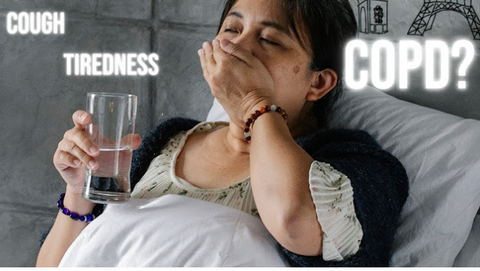COPD and Alcohol: Understanding the Potential Risks
Chronic obstructive pulmonary disease (COPD) is a progressive lung condition characterized by obstructed airflow. While smoking remains the primary risk factor, other lifestyle choices can also influence COPD. This blog explores the potential link between alcohol consumption and COPD, aiming to provide informative insights while promoting awareness of TTLIFE home oxygen concentrators and portable breathing machines as crucial tools in COPD management.
What is COPD and its Impact

Chronic obstructive pulmonary disease (COPD) is a progressive lung condition characterized by obstructed airflow. This makes breathing increasingly difficult, significantly impacting daily life.
Here's a breakdown of COPD and its consequences:
- Causes: Smoking is the primary culprit behind COPD, accounting for over 70% of cases. However, long-term exposure to air pollution and certain occupational hazards can also contribute.
- Symptoms: Common symptoms include breathlessness, especially during physical activity, persistent cough with phlegm (mucus), wheezing, chest tightness, and fatigue.
- Disease Progression: As COPD worsens, everyday activities like climbing stairs, walking, or even talking can become increasingly challenging.
- Complications: COPD can increase the risk of respiratory infections, heart disease, lung cancer, and even death.
Impact on Daily Life
Living with COPD can significantly affect a person's well-being:
- Reduced Physical Activity: Breathlessness often leads to limitations in physical activity, hindering daily routines and leisure pursuits.
- Social Isolation: Difficulty breathing can make social interaction challenging, potentially leading to feelings of isolation and depression.
- Reduced Work Capacity: The limitations imposed by COPD can significantly affect a person's ability to work, impacting their livelihood.
Early diagnosis and proper management are crucial in slowing the progression of COPD and improving quality of life.
Alcohol and the Respiratory System

Studies suggest a complex relationship between alcohol and lung health. While moderate alcohol consumption (generally defined as one drink per day for women and two drinks per day for men) might not directly worsen COPD symptoms, excessive alcohol intake can negatively impact the respiratory system in several ways:
- Reduced Glutathione Levels: Alcohol consumption can deplete glutathione, an antioxidant that protects the lungs from harmful free radicals. This can increase susceptibility to lung damage and infections.
- Impaired Immune Function: Heavy alcohol use weakens the immune system, making the body more vulnerable to respiratory infections, which can exacerbate COPD symptoms.
- Interaction with Medications: Alcohol can interfere with the effectiveness of certain COPD medications, such as antibiotics and steroids.
Potential Risks for People with COPD:
Individuals with COPD should be particularly cautious about alcohol consumption due to the following reasons:
- Worsening of Symptoms: Alcohol can relax the muscles in the airways, leading to increased difficulty breathing and a higher risk of respiratory failure.
- Sleep Quality: Alcohol disrupts sleep patterns and can worsen sleep apnea, a common comorbidity in COPD patients. Portable breathing machines can be helpful in managing sleep apnea by providing continuous positive airway pressure (CPAP) therapy.
- Increased Risk of Hospitalization: Studies have shown a correlation between heavy alcohol consumption and an increased risk of hospitalization for COPD exacerbations.
Recommendations:
- Consult a healthcare professional: It is crucial to discuss alcohol consumption with your doctor to determine a safe approach based on your individual health condition and COPD severity.
- Practice moderation: If you choose to drink alcohol, adhering to moderate consumption guidelines is essential.
- Prioritize lung health: Home oxygen concentrators and portable breathing machines can significantly improve quality of life for COPD patients by managing oxygen needs and supporting respiratory function.
- Focus on a healthy lifestyle: Maintaining a balanced diet, engaging in regular physical activity, and quitting smoking are crucial for managing COPD and promoting overall well-being.
TTLIFE Home and Portable Breathing Machines: Exploring Features and Benefits
TTLIFE offers a range of home oxygen concentrators and portable breathing machines that can be helpful for COPD patients under proper medical guidance. Here's a closer look at some of their features and potential benefits:
-
VARON 5L Portable Oxygen Concentrators
- Tailored Oxygen Delivery: These portable breathing machine provide adjustable flow rates, allowing customization based on individual needs.
- Pulse Dose Technology (on specific models): Certain models offer pulse delivery, which delivers bursts of oxygen synchronized with breathing, potentially improving efficiency and battery life.
- Portable Design: These lightweight and compact portable breathing machines come with carrying bags, enabling use at home, during travel, or while on-the-go.
- Battery Options: TTLIFE portable breathing machines come equipped with a built-in replaceable battery. For extended use away from a power outlet, an additional battery can be purchased separately, ensuring uninterrupted supplemental oxygen therapy.
-
VARON 1-7L/min Home Oxygen Concentrators
- High Oxygen Flow Rates: These home oxygen concentrators deliver a wider range of oxygen flow rates, catering to varying COPD severity.
- Continuous Flow Oxygen Therapy: They provide uninterrupted oxygen delivery, ensuring consistent support for managing oxygen deficiencies.
- User-Friendly Controls: Easy-to-operate interfaces with clear displays allow for adjustments and monitoring of vital settings.
- Remote Control Operation (on specific models): Certain home oxygen concentrators model offer remote controls for added convenience, enabling adjustments without needing to physically access the machine.
Potential Benefits for COPD Patients
- Improved Blood Oxygen Levels: By delivering supplemental oxygen, home oxygen concentrators can help increase blood oxygen saturation, alleviating symptoms like shortness of breath and fatigue.
- Enhanced Mobility and Daily Activities: Increased oxygen availability can improve exercise tolerance and overall stamina, allowing for better engagement in daily activities.
- Sleep Quality Improvement: For patients with coexisting sleep apnea, some concentrators might be compatible with CPAP therapy, promoting better sleep quality.
Important Considerations
- Proper Training: Following proper instructions and attending training sessions are crucial for safe and effective operation of these devices.
- Regular Maintenance: Scheduled maintenance ensures optimal performance and longevity of the equipment.
- Noise level: Consider noise levels, especially for home oxygen concentrators used during sleep.
- Warranty and customer service: Opt for a brand with a comprehensive warranty and reliable customer support.
Conclusion: Taking Charge of Your COPD Management with TTLIFE
Living with COPD requires a proactive approach to managing your health. While moderate alcohol consumption might not directly worsen symptoms, focusing on a healthy lifestyle and utilizing appropriate medical equipment is vital.
Home oxygen concentrators and portable breathing machines can significantly improve your quality of life. These healthy care devices address oxygen deficiencies, ease breathing difficulties, and enhance your ability to participate in daily activities.
Take control of your COPD today. Browse the TTLIFE website online to find a portable breathing machine or home oxygen concentrator that perfectly suits your needs. Experience the freedom of improved breathing and a more active lifestyle. By taking a proactive approach and seeking professional guidance, you can effectively manage your COPD and live a fulfilling life.




